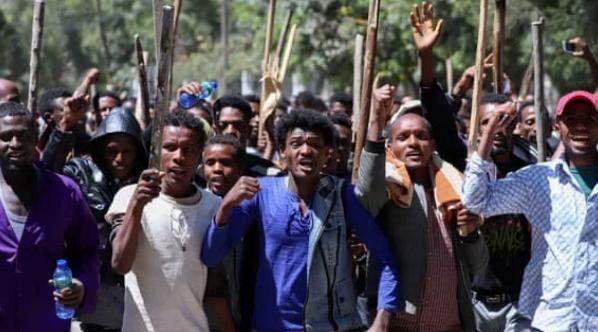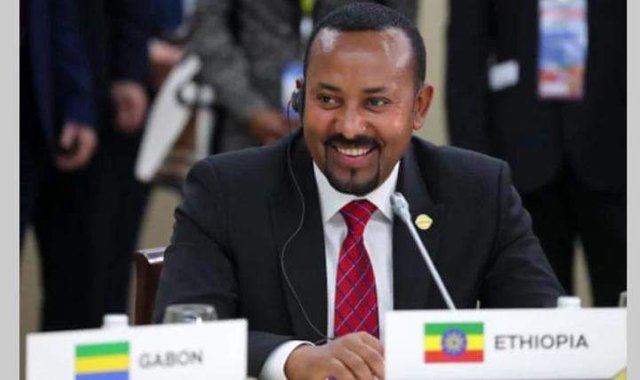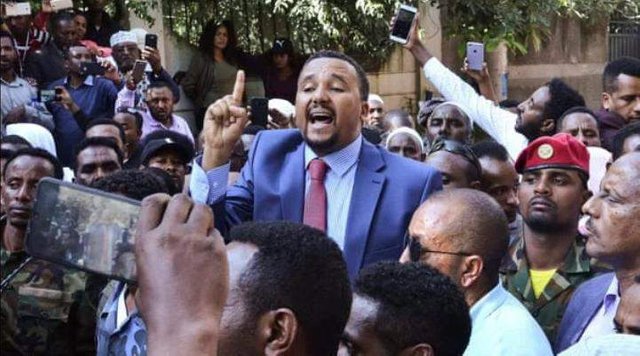Deadly unrest in Ethiopia hampers PM’s political reform attempts
Abiy Ahmed, the prime minister of Ethiopia who won the Nobel peace prize last month, is facing the most serious crisis of his term in office after the death of scores of people in a wave of violent disorder.

Billene Seyoum, Abiy’s spokesperson, blamed “a very senseless act of violence” and said the death toll of 78 could rise.
Seyoum said 409 people had been detained over the unrest and that this figure too could rise.
The violence began when political protests rapidly evolved into clashes fuelled by ethnicity and religion.
The unrest in the Oromia region – the heartland of the majority Oromo ethnic group – underlines the significant challenges for Abiy before next May’s scheduled elections.
Abiy is the country’s first leader from the Oromo community, who have long complained of economic, cultural and political marginalisation

The 43-year-old was awarded the Nobel prize for the peace deal he concluded with neighbouring Eritrea last year, three months after coming to power. The agreement resolved nearly two decades of military stalemate following a border war that ended in 2000.
Abiy has also pushed through reforms at home, dramatically changing the atmosphere in what was regarded as a repressive state. Measures have included the lifting of a ban on political parties, the release of imprisoned journalists and the sacking of previously untouchable officials, some of them accused of torture.
The former military intelligence officer’s public renunciation of past abuses drew a line between his administration and those of his predecessors, as did the appointment of former dissidents and large numbers of women to senior roles.
The trigger for the recent violence was a Facebook post by Jawar Mohammed, an Oromo activist and media mogul, claiming that security forces had tried to orchestrate an attack against him
Supporters took to the streets last week to protest. Crowds of young men from his Oromo ethnic group quickly turned their anger against Abiy, saying that he had betrayed them by mistreating Jawar.

Officials have denied Jawar’s claim that he was targeted.
Abiy was booed by protesters on Thursday during a visit to Ambo, a site of earlier violence 50 miles (80km) west of the capital, Addis Ababa.
Analysts say Abiy’s reforms have lifted the lid on long-repressed tensions between the country’s many ethnic groups.
Temesgen Ababa, 17, described how security forces opened fire in Adama, a city of 300,000 people south-east of the capital, hitting an eight-year-old boy. When Temesgen rushed over to help the boy, he was shot in the chest.
“How can shooting at people like that become an appropriate response?” Temesgen asked from his hospital bed.
The Ethiopian Human Rights Commission estimates that 10 of the deaths last week were at the hands of security forces.
“Adama is a melting pot of Ethiopian ethnic and religious groups, with many different groups, so these incidents of violence rooted in religion and ethnicity can be very dangerous,” said Fisseha Tekle, a researcher with Amnesty International. “It can be a premonition for mass atrocities.”
Attacks on churches and at least one mosque were also reported during the clashes.
At Adama hospital, nearly 200 people sought treatment and 16 died – numbers hospital staff said were unprecedented. Medics described scrambling to find beds and supplies for patients who had been shot and beaten as protests erupted last Wednesday.
“Most of the people were under stress, even including the staff, because this was sudden and the first time like this in this town,” Dr Desalegn Fekadu, a surgeon, said.
There are signs that Abiy, who welcomed Jawar home, may now move to close down political space that has opened up since he took power.
With elections due next year, Abiy must balance demands for political freedoms with the need to restrain political actors who are mobilising ethnic identities by demanding more access to land, power and resources for their communities.
Abiy’s feud with Jawar also complicates his plans to pursue controversial reforms such as transforming Ethiopia’s ruling coalition into a political party, analysts and diplomats say.
The coalition of four parties has been in power since a Marxist dictatorship was ousted in 1991. Officials recently expressed anger at some media outlets that they described as unprofessional and partisan.
Ethiopia’s economic transformation is one of the continent’s success stories but could easily be derailed by instability or widespread violence. A key challenge is to provide jobs to young people. Of the 104 million inhabitants, 41% are under the age of 15, and 28% aged15 to 29.
Last week, the government unveiled a package of measures that aims to create 20m new jobs by 2025.
Posted using Partiko Android
Congratulations @amendolee! You have completed the following achievement on the Steem blockchain and have been rewarded with new badge(s) :
You can view your badges on your Steem Board and compare to others on the Steem Ranking
If you no longer want to receive notifications, reply to this comment with the word
STOPVote for @Steemitboard as a witness to get one more award and increased upvotes!